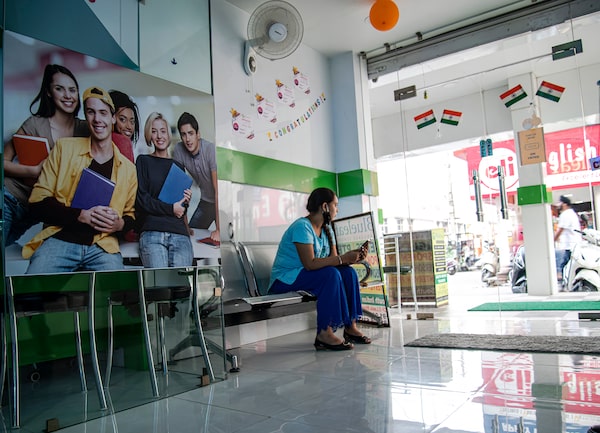
A girl waits in the institute in Leela Bhawan, a hub for IELTS institutes and immigration consultants, as aspirants for going abroad to study have increased in Patiala, India.PRIYANKA PARASHAR/The Globe and Mail
Immigration Minister Sean Fraser says his department has shifted its focus toward tackling backlogs in student visa applications, as many students who have been accepted to attend Canadian universities and colleges this semester wait nervously for their immigration approvals.
The minister made the comments Monday as part of the first news conference by the task force to improve government services. Prime Minister Justin Trudeau announced the team of cabinet ministers in June when the federal government was facing heavy public criticism for failing to provide basic services, such as timely passport delivery or efficient traveller processing at Canadian airports.
Mr. Fraser said his department recently shifted its focus away from work permits to tackle the demand for student visas.
“We had been focusing over the course of the summer on processing as many work permits as possible to help address the labour shortage. We’ve made a pivot, and through the month of August, we expect that we’re going to process a little more than 104,000 additional study permits,” he said. “There has been an absolute explosion in demand when it comes to Canada’s International Student Program in recent years.”
The student visa delays recently prompted a complaint from the Indian High Commission in Ottawa. India is the largest source country for international postsecondary students.
In addition to Mr. Fraser’s update, Monday’s news conference included assurances from Families, Children and Social Development Minister Karina Gould that passport wait times had improved and an update from Transport Minister Omar Alghabra, who said delays and cancelled flights have been dramatically reduced.
Opposition MPs said the task force is little more than a public relations exercise. They also say some of the improvements in areas such as passports and travel delays can be attributed to the fact that the summer travel season is coming to an end.
As for the Immigration Minister’s comments about student visas, Conservative and NDP MPs said this is part of a continuing pattern of shifting focus from one crisis to another, which they say ultimately creates bigger problems for the system as a whole.
Conservative MP Jasraj Singh Hallan said the students awaiting visas are expecting to start classes shortly.
“There are many students that are still left in limbo in this immigration backlog,” he said. As for the task force, he said many of the members are the same ministers who are ultimately responsible for the service issues.
“This task force really hasn’t shown or done anything yet,” he said.
NDP MP Jenny Kwan said Canada’s immigration system, including student visa applications, is in a state of chaos. She said operating in a constant state of “crisis management mode” is not sustainable.
Ms. Kwan said there should be independent reviews of the key departments to determine why services are failing.
“The task force was established as a political cover-up,” she said.
International students from outside Canada pay tuition that is often more than two or three times higher than those paid by domestic students.
Naman Gupta, a 22-year-old student in New Delhi, India, was planning to attend York University this fall to pursue a postgraduate certificate.
His study permit has not come through and he said unless something changes in a matter of days, he’ll defer coming to Canada until the start of the January term. However the $17,000 in tuition he paid won’t be returned in the meantime, he said.
“It’s going to be tough. All my plans are held up,” Mr. Gupta said. “I’m pretty stressed.”
He said he expected the visa processing would have been expedited to ensure that students could arrive in time for the start of their courses.
“I would’ve appreciated if they could apply more compassion to the situation,” Mr. Gupta said. “The response is slow.”
Pallavi Dang, who lives in New Delhi, applied for her study permit in March. She’s disappointed that more than five months later she still hasn’t heard whether she will be approved. Department guidelines said respondents can normally expect an answer in eight weeks, and that current average processing times are about 12 weeks.
She said she had made plans to hand over her business while she was away, but now she’ll need to change course.
“All that planning is on hold,” Ms. Dang said. “I’m not able to take another step.”
Paul Davidson, president of Universities Canada, an umbrella group that lobbies on behalf of nearly 100 Canadian universities, said Canada trails countries such as Britain and Australia in visa processing.
He said there has to be more federal government investment in IT capacity to speed up processing.
“I think that’s really the solution,” Mr. Davidson said. “There’s all-party support for international students, there’s a good policy climate, but it’s the operational reality that needs to improve.”
For subscribers: Get exclusive political news and analysis by signing up for the Politics Briefing.